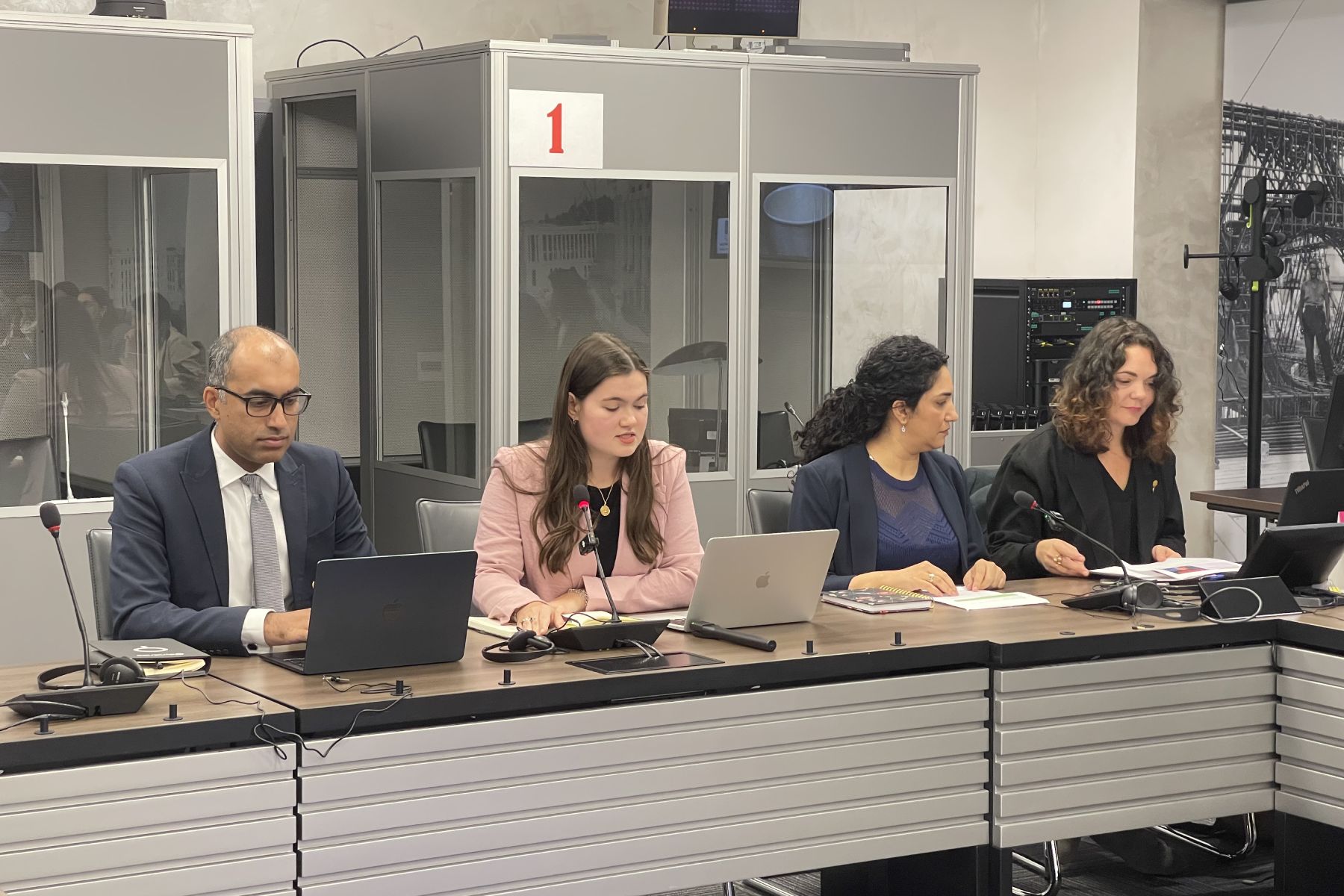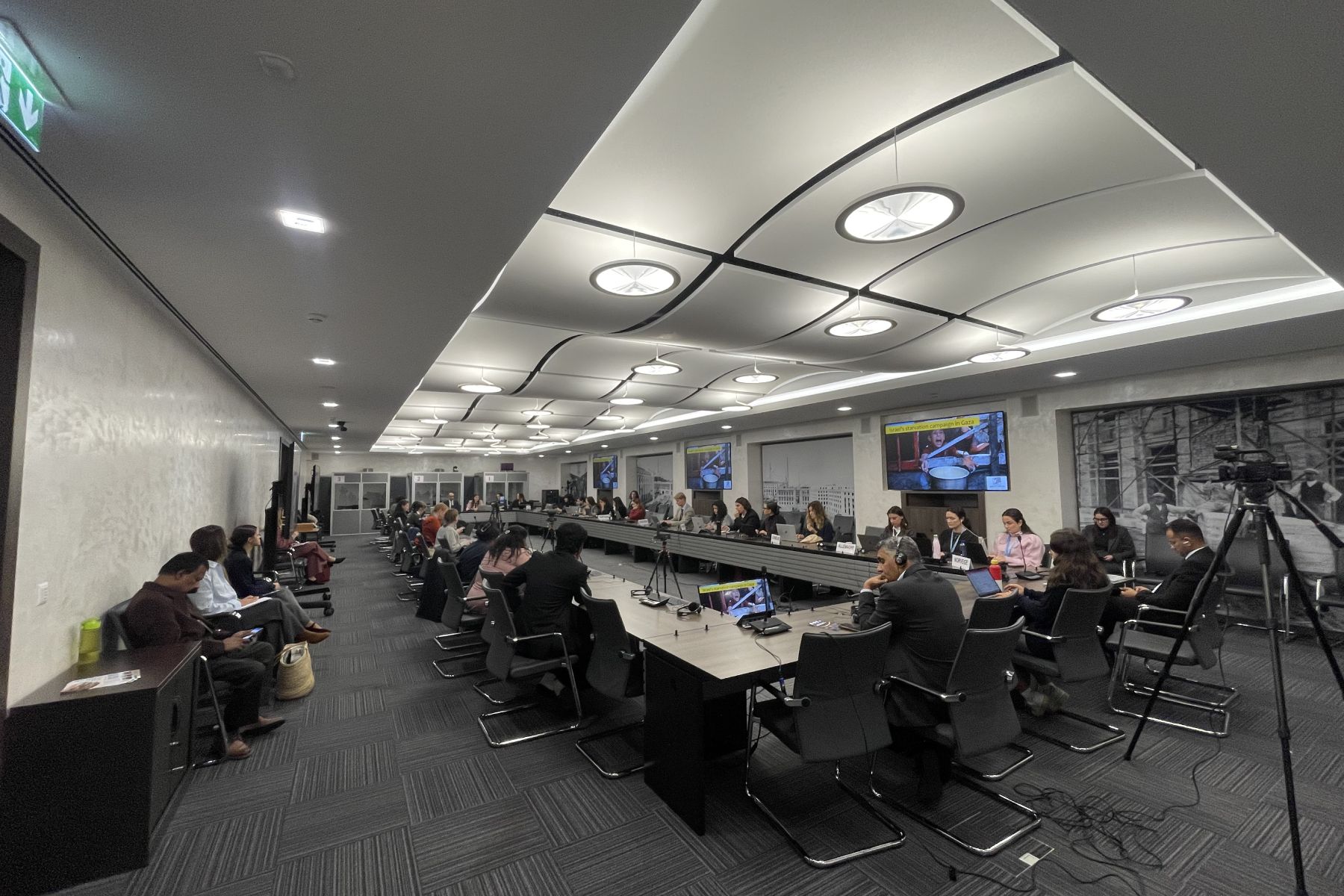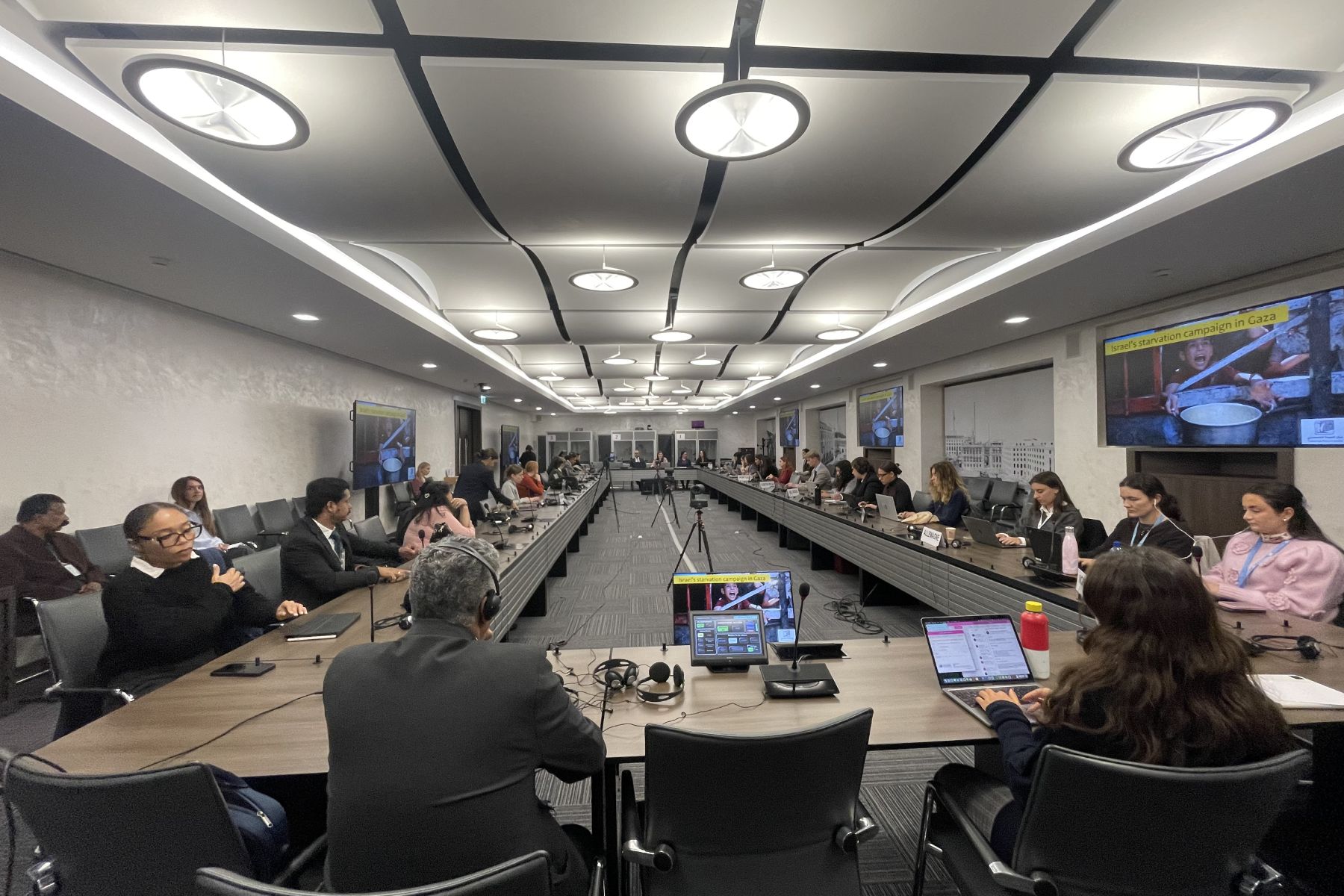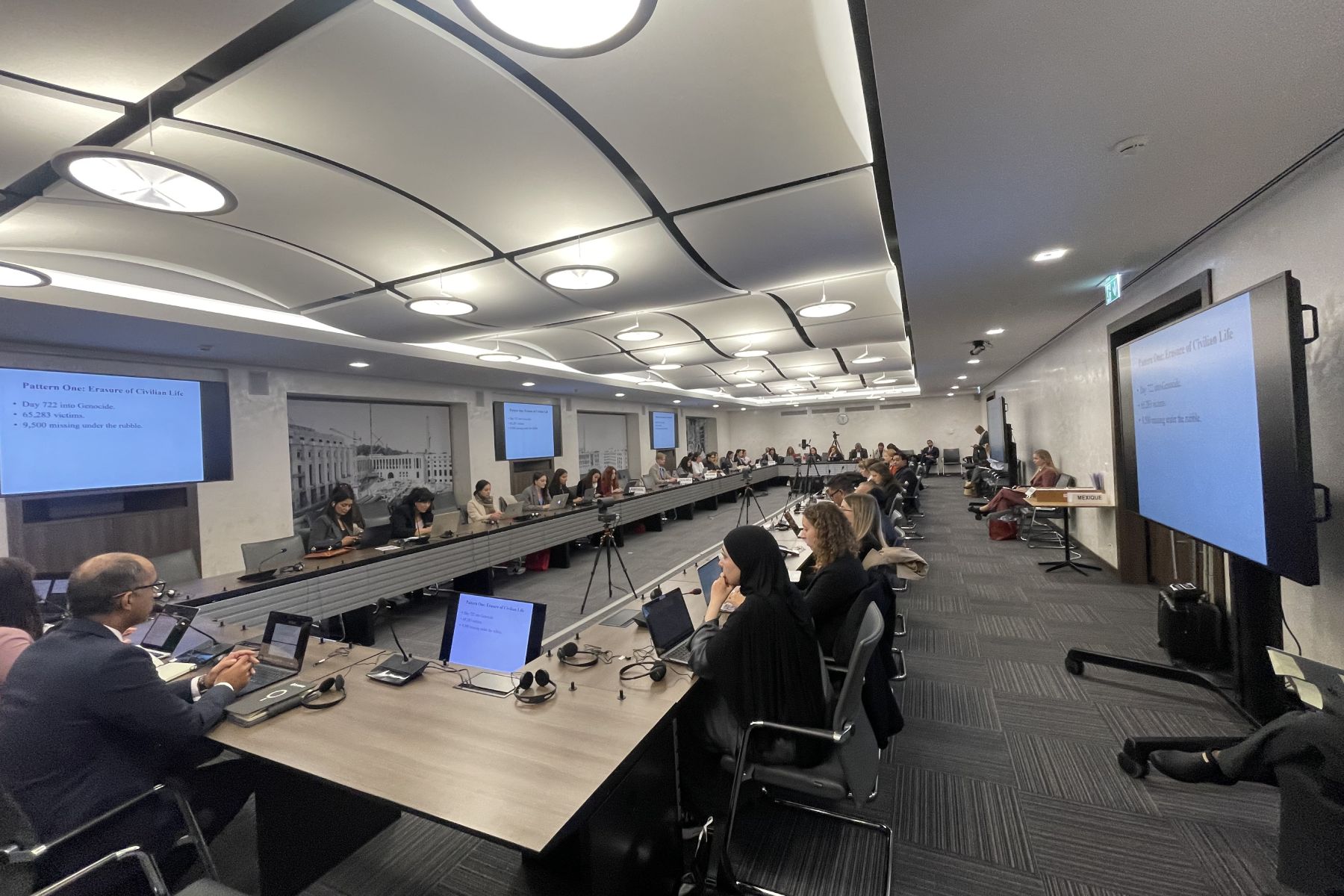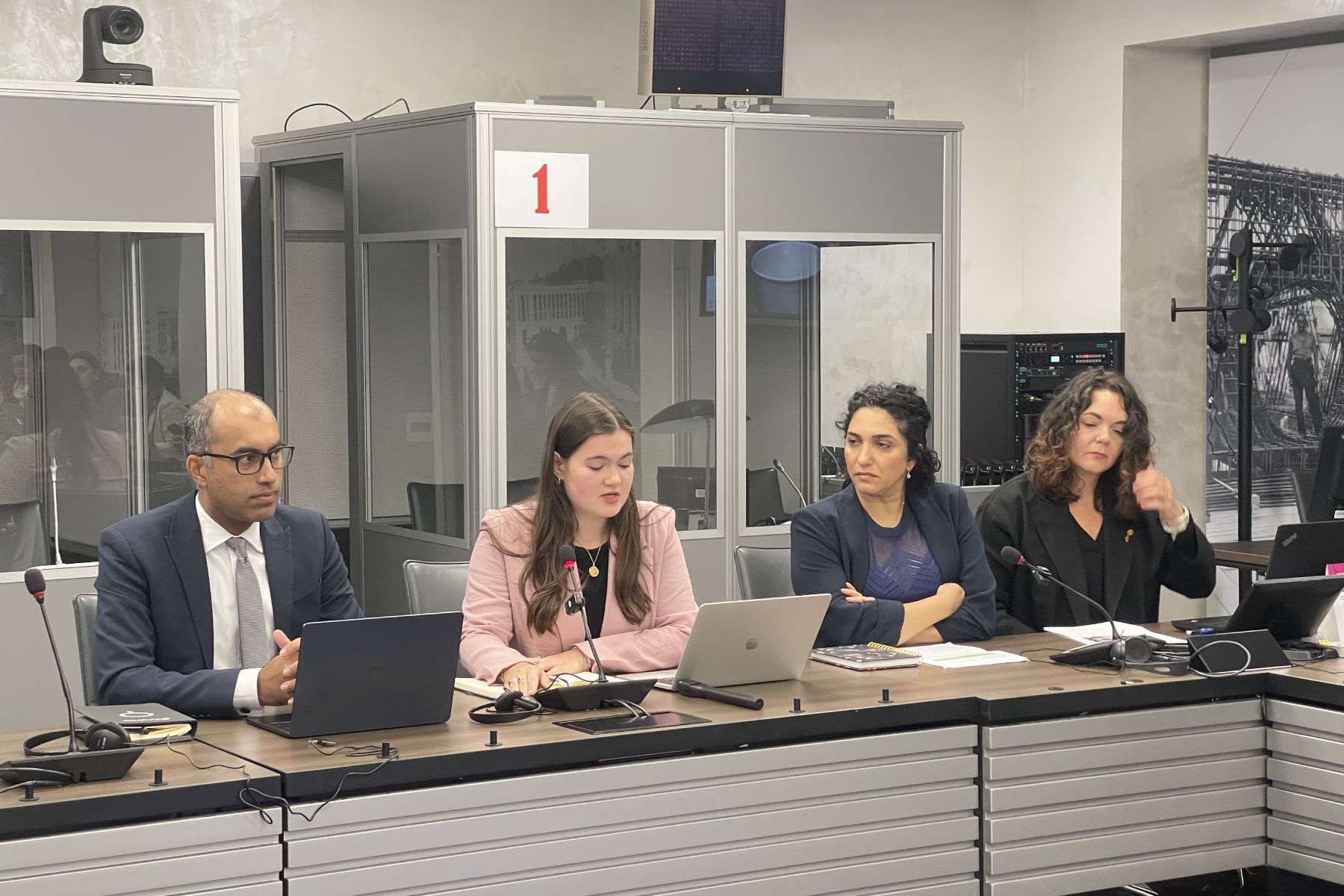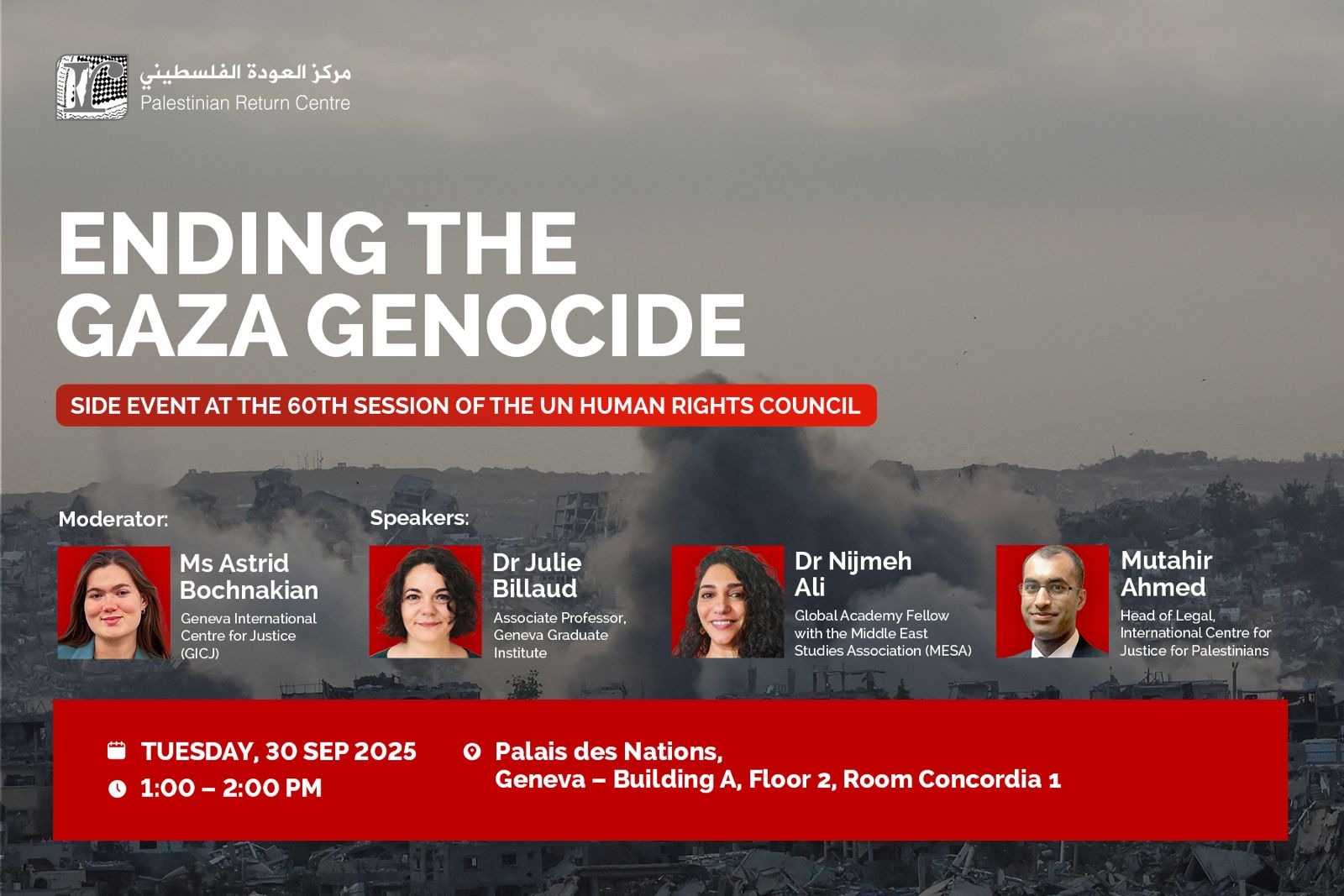At PRC’s UN Seminar: Experts Present Evidence of “Engineered Famine” in Gaza and Outline Roadmap to End Impunity

Geneva, Switzerland – On the sidelines of the 60th session of the Human Rights Council, the Palestinian Return Centre (PRC) organised a seminar entitled “Ending the Gaza Genocide.” The panel provided a comprehensive legal and humanitarian analysis, exposing systematic strategies of famine engineering and the destruction of life-sustaining systems, while offering insights into mechanisms of international accountability. The speakers stressed that what is unfolding in Gaza is not merely war, but a fully-fledged genocide project that demands urgent and decisive international action.
The discussion was moderated by Ms. Astrid Bochnakian of the Geneva International Centre for Justice, who affirmed in her opening remarks that the characterisation of events in Gaza as genocide is no longer limited to NGOs, but has been adopted by official international bodies such as the UN Independent International Commission of Inquiry—placing direct legal responsibility on the international community.
Systematic Famine Engineering: Exposing Israel’s “Starvation Experiment”
In a pivotal evidence-based intervention, Dr. Julie Billaud, Associate Professor at the Geneva Graduate Institute, delivered a striking analysis of how Israel employs starvation as a deliberate military strategy and integral component of its genocide project in Gaza. She began by noting that the Famine Review Committee (FRC) had officially confirmed the occurrence of famine in Gaza in August 2025, a result described by major human rights organisations as “man-made,” aimed at forcibly displacing Palestinians and dismantling their social fabric.
Dr. Billaud explained that although Israeli officials officially deny this starvation policy, it is openly endorsed by senior government ministers—citing Finance Minister Bezalel Smotrich’s statement that “starving Gaza’s residents to death would be fair and moral,” and National Security Minister Itamar Ben-Gvir’s demand that the “enemy” should receive no food or electricity.
She described a pattern she termed the “Starvation Experiment”, where aid is not cut off entirely but “calibrated to avoid an official famine declaration.” This occurs through cycles of sharp food supply reductions during major military operations, followed by temporary increases under international pressure—“short-lived and wholly insufficient” increases.
Dr. Billaud further noted that this policy predates October 2023, citing a 2006 statement by an adviser to the Israeli Prime Minister: “The idea is to put the Palestinians on a diet, but not to make them die of hunger”—a policy implemented through calorie counts on food allowed into Gaza.
She presented alarming figures on the systematic destruction of Gaza’s life-supporting systems: nearly 80% of agricultural land eliminated; 71% of greenhouses and 83% of agricultural wells destroyed; 89% of water and sanitation infrastructure damaged or destroyed, leaving over 90% of households without water security; and documentation of more than 322 attacks on humanitarian aid and aid workers.
Most critically, she described Israel’s dismantling of UNRWA’s civilian aid system and its replacement with a militarised structure—the so-called “Gaza Humanitarian Foundation” (GHF). She characterised this system as “inherently lethal,” replacing roughly 400 distribution points with only four “mega-sites” located in active combat zones, forcing families into danger. Civilians were channelled through narrow, cattle-pen-like corridors, with live ammunition used to disperse crowds, killing hundreds.
Dr. Billaud concluded that this militarised aid model constitutes genocide under the Genocide Convention, as it “kills Palestinians and destroys the group as a whole through collective dehumanisation, dismantling of social fabric, and separation of the people from their land,” producing “social death” alongside biological death. She ended with clear demands: activation of the Uniting for Peace resolution, opening of all crossings, immediate suspension of militarised aid mechanisms, provision of international protection for aid convoys, and the imposition of an immediate and permanent ceasefire.
Anatomy of Genocide: Five Patterns of Destruction and a Roadmap for Accountability
Dr. Nijmeh Ali, Fellow at the Middle East Studies Association, provided a structural analysis of what she described as a “deliberate genocide project” that goes beyond mere ceasefire demands. She argued that what is unfolding in Gaza is not a reaction but a long-standing pattern of destruction and blockade reaching “genocidal intensity.” She dissected this project into five interlocking and systematic patterns:
In the second part of her address, Dr. Ali outlined a practical roadmap for confronting this project, stressing that the answer lies in “pressure, and more pressure.” She urged states to move beyond “empty condemnations” towards concrete measures: a comprehensive arms embargo, suspension of cooperation agreements, support for international courts (ICJ and ICC), economic sanctions against complicit corporations, reinforcement of academic and cultural boycotts, and mobilisation of civil society to keep Palestine central to the global agenda.
She closed with a crucial note: pressure on Israel “is not merely a Palestinian test, but a test of whether international law, the UN Charter, and human rights have any meaning at all”—citing the historic success of international pressure in dismantling South Africa’s apartheid system as proof that change is possible.
From London to The Hague: A Multi-Front Legal Strategy to Constrain Impunity
Mr. Mutahir Ahmed, Head of Legal at the International Centre of Justice for Palestinians (ICJP), presented a detailed and practical account of the organisation’s multi-front legal strategy. He began with the UK domestic front, explaining that ICJP had filed complaints against four UK government ministers for complicity in war crimes, as well as a separate detailed complaint on the crime of starvation as a weapon of war, supported by an 800-page evidentiary file. He added that complaints had also been lodged against Israeli officials holding British nationality for aiding, abetting, and conspiring in war crimes.
He emphasised that the cornerstone of these efforts is the systematic evidence-gathering by ICJP’s special investigation unit since October 2023, which has collected crucial testimonies from doctors working in 11 different Gaza hospitals, alongside statements from evacuated Palestinian victims—ensuring that all evidence meets the stringent standards of British and international courts. He revealed that this documented evidence had a direct and decisive international impact, having been shared in full with South Africa’s legal team, and forming the factual backbone “heavily relied upon” in its genocide case before the International Court of Justice.
Turning to the pursuit of war enablers, he highlighted ICJP’s litigation against the UK government over arms exports. While pressure resulted in the partial suspension of 29 out of 350 licences, the government deliberately excluded the F-35 fighter jet programme. Although the High Court declined to intervene on grounds of “high foreign and national security policy,” Mr. Ahmed underlined that pressure continues through other channels—such as successful divestment campaigns targeting major institutions like Trinity College Cambridge, and direct warning letters to directors of 20 British arms companies about their potential criminal liability.
He concluded by presenting the “Global 195” project, describing it as a global legal alliance to ensure no safe haven for those accused of war crimes. The initiative seeks to expand accountability beyond political leaders to any individual who participated in or facilitated crimes—including soldiers—by activating national judicial systems across states ranging from Malaysia and Turkey to Canada, Hungary, Romania, and Albania. He closed by reaffirming ICJP’s vision: ensuring that all complicit in war crimes and crimes against humanity—“from the top to the bottom of the chain of command”—are brought to justice.
In-Depth Discussion: Bridging the Accountability Gap and Moving from Condemnation to Action
The discussion session witnessed deep engagement on the greatest challenge facing international justice: the “accountability gap.” Participants questioned why international mechanisms continue to fail victims despite the clarity of international law prohibiting starvation as a weapon of war.
Speakers agreed the issue lies not in the absence of law but in the political will to enforce it. They stressed that international legal processes are inherently slow, particularly when targeting senior officials—making “pressure, and more pressure” through coordinated efforts by rights groups and legal teams essential, alongside immediate and systematic evidence collection.
Responding to questions on moving from “talk to action,” the speakers were unequivocal. They highlighted that economic and academic sanctions have proven effective in driving political change—giving a strong example of how the mere threat of cutting “Marie Curie” funding to Israeli universities pushed 100 Israeli academics to pressure their government. A direct call was made to attending diplomats to fulfil their duties by activating UN Charter mechanisms such as Uniting for Peace, stressing that states must “do their job” to safeguard the international order.
The seminar concluded with a collective affirmation that accountability must extend beyond international courts to include financial networks and arms companies supporting these crimes, and to pursue individuals in their home jurisdictions—ensuring that all complicit in war crimes and crimes against humanity, from the top to the bottom of the chain of command, are brought to justice.
Watch the seminar here:
More pictures:
